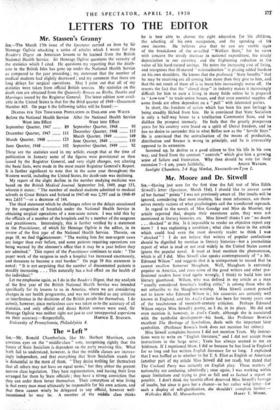Mr. Moore and Dr. Sitwell
Sta,—I-Iaving just seen for the first time the full text of Miss Edith Sitwell's letter (Spectator, March 31st), I should like to answer some of her factual " points" I was not previously aware of. Her insults will be ignored, considering that most insulters, like most reformers, are them- selves merely victims of what psychologists call the transferred reproach.
In regard to the novels of Miss Goudge and Miss du Maurier, my article reported that, despite their enormous sales, they were not mentioned in literary histories, etc. Miss Sitwell thinks I am " no doubt ... shocked " at this. Is it impossible to render an objective report any more ? I was explaining a condition ; what clue is there in the article which could lead even the most slovenly reader to think I was " shocked " ? I do not believe that writers of popular confections should be dignified by mention in literary histories—but a journalistic' report of what is read or not read widely in the United States cannot ignore the popular novel. It must at least mention the phenomenon, which is all I did. Miss Sitwell also speaks contemptuously of " a Mr. Edmund Wilson " and suggests that it is unimportant to record that he cannot swallow Somerset Maugham. Well, Maugham is extremely popular in America, and even some of the good writers and other pro- fessional readers have tried (quite wrongly, I think) to build him into literary gianthood. Wilson, who was defined in my article as a man "usually considered America's leading critic," is among those who dO not subscribe to the Maugham-worship. Miss Sitwell cannot pretend not to know who Edmund Wilson is ; his causeries are certainly well known in England, and his Axel's Castle has been for twenty years one of the touchstones of twentieth-century criticism. Perhaps Edmund Wilson enjoys Miss Sitwell's poetry, as I do, in its place. He did not even mention it, however, in Axel's Castle, although she is associated with the symbolist development—his book, like Professor Bowra's excellent The Heritage of Symbolism, deals with the important later symbolists. (Professor Bowra's book does not mention her either.)
Miss Sitwell complains because I did not mention Yeats. My instruc- tions were to write on " English literature," and I did not accept these instructions in the large sense ; Yeats has always seemed to me an Irishman. If I mentioned Shaw, I did so because he has lived in England for so long and has written English literature for so long. I explained that I was baffled as to whether to list T. S. Eliot as English or American (another part of my article Miss Sitwell did not read), but stated that The Cocktail Party was certainly an English play. These matters of nationality are confusing, admittedly ; once again, I was working within space limitations and trying to give as full and as factual a report as possible. I don't think my humble effort deserved Miss Sitwell's barrage of insults, but since it gave her a chance—in her rather wild letter—for such a display of self-glorification, she shouldn't complain further.—
Wellesley Hills 82. Massachusetts. HARRY T. MOORE.










































 Previous page
Previous page